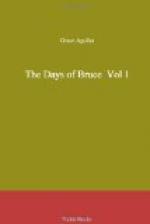The wood behind him was still plunged in deep shadows, and he knew the Grampian Hills, with all their inaccessible paths and mountain fastnesses—known only to the true children of Scotland—could easily be reached, were the pursuit of the English eluded, which he believed could be easily accomplished, were they once enabled to retreat into the wood.
The consummate skill and prudence of the Bruce characterizing him as a general, even as his extraordinary daring and exhaustless courage marked the warrior, enabled him to effect this precarious and delicate movement, in the very sight of and almost surrounded by foes. Covering his troops, or rather the scattered remnant of troops, by exposing his own person to the enemy, the king was still the first object of attack, the desire of securing his person, or, at least, obtaining possession of his head, becoming more and more intense. But it seemed as though a protecting angel hovered round him: for he had been seen in every part of the field; wherever the struggle had been fiercest, he had been the centre; twice he had been unhorsed, and bareheaded almost from the commencement of the strife, yet there he was still, seemingly as firm in his saddle, as strong in frame, as unscathed in limb, as determined in purpose, as when he sent back his acceptance of Pembroke’s challenge. Douglas, Fitz-Alan, Alexander and Nigel Bruce, and Alan of Buchan, still bearing the standard, were close around the king, and it was in this time of precaution, of less inspiriting service, that the young Alan became conscious that he was either severely wounded, or that the strength he had taxed far beyond its natural powers was beginning to fail. Still mechanically he grasped the precious banner, and still he crossed his sword with every foe that came; but the quick eye of Nigel discerned there was a flagging of strength, and he kept close beside him to aid and defend. The desired goal was just attained, the foes were decreasing in numbers, for they were scattered some distance from each other, determined on scouring the woods in search of fugitives, the horses of the king and his immediate followers were urged to quicken their pace, when an iron-headed quarrel, discharged from an arbalist, struck the royal charger, which, with a shrill cry of death, dropped instantly, and again was the king unhorsed. The delay occasioned in extricating him from the fallen animal was dangerous in the extreme; the greater part of his men were at some distance, for the king had ordered them, as soon as the unfrequented hollows




